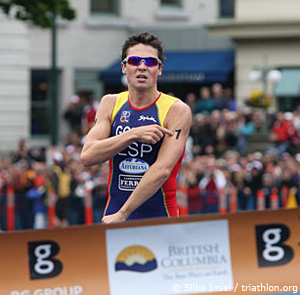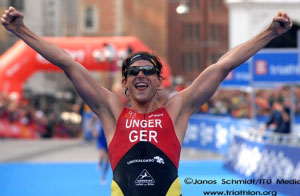ITU replaces one-day Elite World Championship with new six-race ‘Super Series’
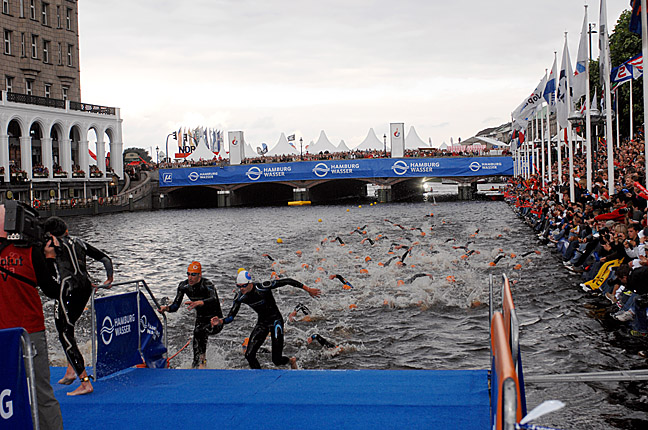
The day after a spine-tingling men’s Olympic triathlon final, the International Triathlon Union announced that it was extending the one-day elite World Championship format it started in 1989 into a six-race World Championship points super series culminating in a Grand Final to be held in the Fall.
ITU spokespersons said the plan is to eliminate and replace the one-day elite World Championship format begun in 1989 in France with the super series.
ITU Television and media director Brian Mahony said that prize money for the series will be announced at the official Series launch later in 2008.
The key to the move, said Mahony, was the ITU’s goal of “expanding the sport of triathlon and reaching into the mainstream.” And in order to do that, he said, the super series and Grand Final race courses would be carefully chosen to be held in “in the downtown city centers of the major capitals of the globe, racing before large crowds past major iconic landmarks.”
That description best fits two ITU courses — the 2000 Sydney Olympic course which wound past the famed Sydney Opera House and the Sydney Harbour Bridge, and the 2007 Hamburg ITU World Championship course at which an estimated 150,000 screaming German fans lined city streets and lakeside stands to cheer on home country hero Daniel Unger to an exciting come-from-behind win.
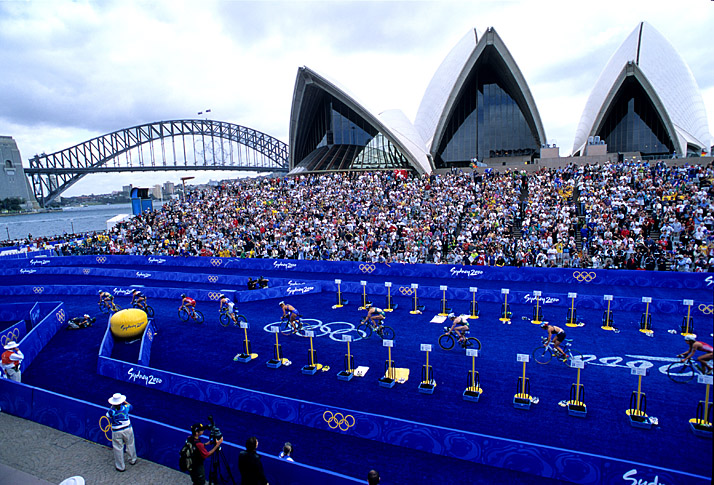
According to Mahony, the ITU believes that key to growth and reaching the level of major sports is gaining a bigger TV audience. In order to do that, the ITU has made an agreement to partner with The Lagardere Group, a French conglomerate which also owns the EADS high technology group – including Matra Aerospatiale, Hachette Fillipachi Medias – the world’s largest magazine group, Vivendi Universal Publishing, and Virgin Megastores.
One of the other properties is the German-based Sportfive sports TV marketing group, which handles major European soccer accounts, the World Rally Championship, the Swedish ice hockey league, and the Pan Am Games.
The ITU and Sportfive will work with the Hamburg-based Upsolut event organizers who produced the enthusiastically received Hamburg World Championship.
After years of hard work producing live internet and television coverage of World Championships and prestigious World Cup events with modest budgets, the ITU media and Television Department plans to step up their game.
“With the clout of the Lagardere Group and Sportfive, we present the super series and Grand Final events in live High Definition broadcasts with higher production and technological values which will help make our amazing athletes heroes to the general public, as they deserve to be,” said Mahony.
He added that Sportfive’s TV marketing reach won’t be confined to European markets.
“”This new format will provide our athletes with a stage to showcase their triathlon to the world,” said ITU Executive Director Loreen Barnett. “With the success of the Beijing Olympic triathlon, we feel there is no better time to announce our future direction. No one has done this in our sport before, and we are proud to be leading triathlon into a new era.”
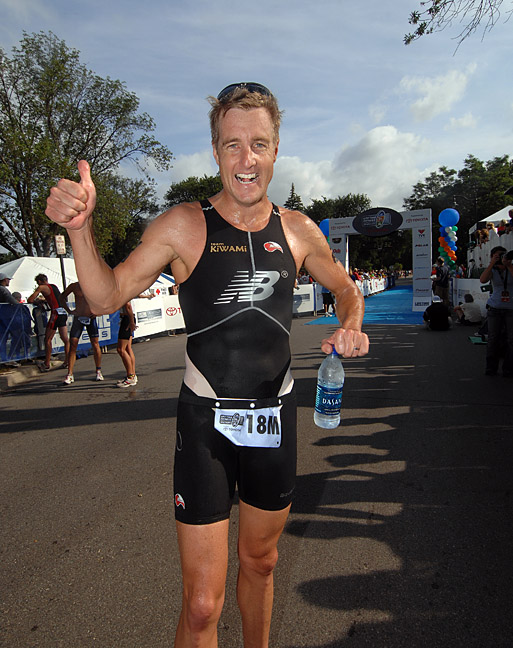
Points distribution
Mahony said that for the first three years of this system, the ITU’s super series would begin in late March or early April and consist of an average of one race a month culminating in a Grand Final in September. In Olympic years, said Mahony, the Grand Final would be held in October or November.
According to Mahony, the plan for determining the World Champions would be the athletes accumulating the highest points during the super series – not the winners of the Grand Final.
While the six super series races would not eliminate many long standing elite World Cup races with their current standard prize purses of $100,000, their status and prestige would be a step below the super series events.
Mahony explained that to qualify for the Grand Final, elite ITU triathletes would accumulate points from their best results in four events. “They may include results from standard World Cup events, but those events will award fewer points,” said Mahony.
The reaction
Many of the top triathletes were caught unaware and, lacking detail which will be withheld until a planned press conference in November, were tentatively happy that the ITU seemed to be raising the bar for triathlon growth.
“This is fantastic for triathlon,” said new Olympic men’s champion Jan Frodeno of Germany. “It is similar to F1 racing where the top athletes are battling head-to-head. Using the Hamburg World Cup model is ideal as 100,000 spectators and TV makes it easier for us to market ourselves. As it snowballs, all the top athletes will want to come.”
Olympic women’s champion Emma Snowsill of Australia also lauded the new format – could it be because she would always hold the women’s single-day World Championship record at three wins?
“This is a great step forward for triathlon,” said Snowsill. “Live TV creates a proper season so people will know when to watch and tune in.”
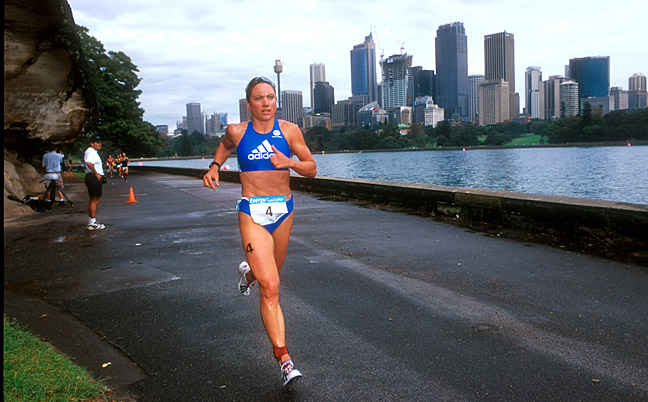
Others were cautiously optimistic.
“I like the fact that they will be doing it in big cities like Hamburg or Sydney, or New York,” said US star Hunter Kemper. “I think they might have been inspired by the Life Time Fitness series which offers tough competition in an Olympic year with $60,000 top prizes at Minneapolis and Dallas as well as the big bonus pool.”
Greg Bennett, who cleaned house to the tune of $500,000 by winning all five races in the 2007 Life Time Fitness series, likes the series but laments the loss of the one day ITU World Championship. “I’ll be very upset to see the one-day World Champs go,” said the Australian. “But I think reducing the long World Cup season to six or seven big payday events and emphasizing a big super series points bonus pool is great. It seems to me at its best, the Super Series will emulate the Association of Surfing Professionals World Tour won by Kelly Slater eight times. In that tour, Slater proves he can win on big and small waves under a variety of conditions and is a true world champion.”
Bennett, who has worked hard to promote the Life Time Fitness Series, is optimistic that the ITU super series won’t be a zero sum game with ITU races occupying Life Time Fitness race dates and forcing athletes to choose between the two. “(Life Time Fitness CEO) Bahram Akradi believes very much that professional triathletes are some of the greatest athletes of any type in the world. He believes they are underpaid and underpublicized. He hoped when he put substantial amounts of his company’s money into the Lifetime races starting in 2002 that the rest of the world would step up to his challenge and do the same. I believe there is room in the sport for both series.”
US star Andy Potts said “The concept is pretty cool. If we could raise the sport to what tennis has achieved with Wimbledon and the US Open, great for the sport and wonderful for the athletes.”
But, recalling the friction and disputes over dates that bedeviled the early days of Life Time Fitness and the ITU World Cup series, Potts offered this note of caution. “Let’s hope that the ITU isn’t aiming this to compete with the Life Time Fitness series. I don’t know what cities and what dates they will pick, but I really believe the organizations are well beyond that now. If that proves to be the case, I will be very disappointed.”
US Olympian Matt Reed was similarly positive – with a few caveats. “I like the idea of fewer super series races with each one being more important,” said Reed. “It will make each of the six super series races more of a spectacle instead of chasing 12 World Cups all over the World. It would be better to try to hit all six really well. On the other hand, this will devalue the regular World Cup races, some of which are classics.” Reed also thinks eliminating the one-day World Championship is a bad idea. “It’s a one day stress test, a dress rehearsal for the pressure of the Olympics, and we will miss it.”
When asked if the ITU might consider giving the super series and Grand Final a separate designation and retaining a one-day World Championship, Mahony said: “In order to set courses in and around iconic landmarks of major world capitals, we knew it was very expensive to lock down city centers. To unlock the funding and support, we felt we had to make it a world championship series. We were aware this will be a monumental change in our sport’s structure. This was not taken lightly. We knew we were taking a risk and there would be sincere criticism. But we are willing to take the heat because we believe the result will be great for the long term health of the sport.”
One prominent triathlon manager and agent offered this cautionary note. “Right now, there is zero money attached to it. They have hired a marketing company to make it a reality to look for sponsors to fund it. It kind of makes you wonder if this is a way for the ITU, after the lucrative BG sponsorship ran out, to pull in its horns, get rid of some races from its World Cup series, and put a happy face on it.”


